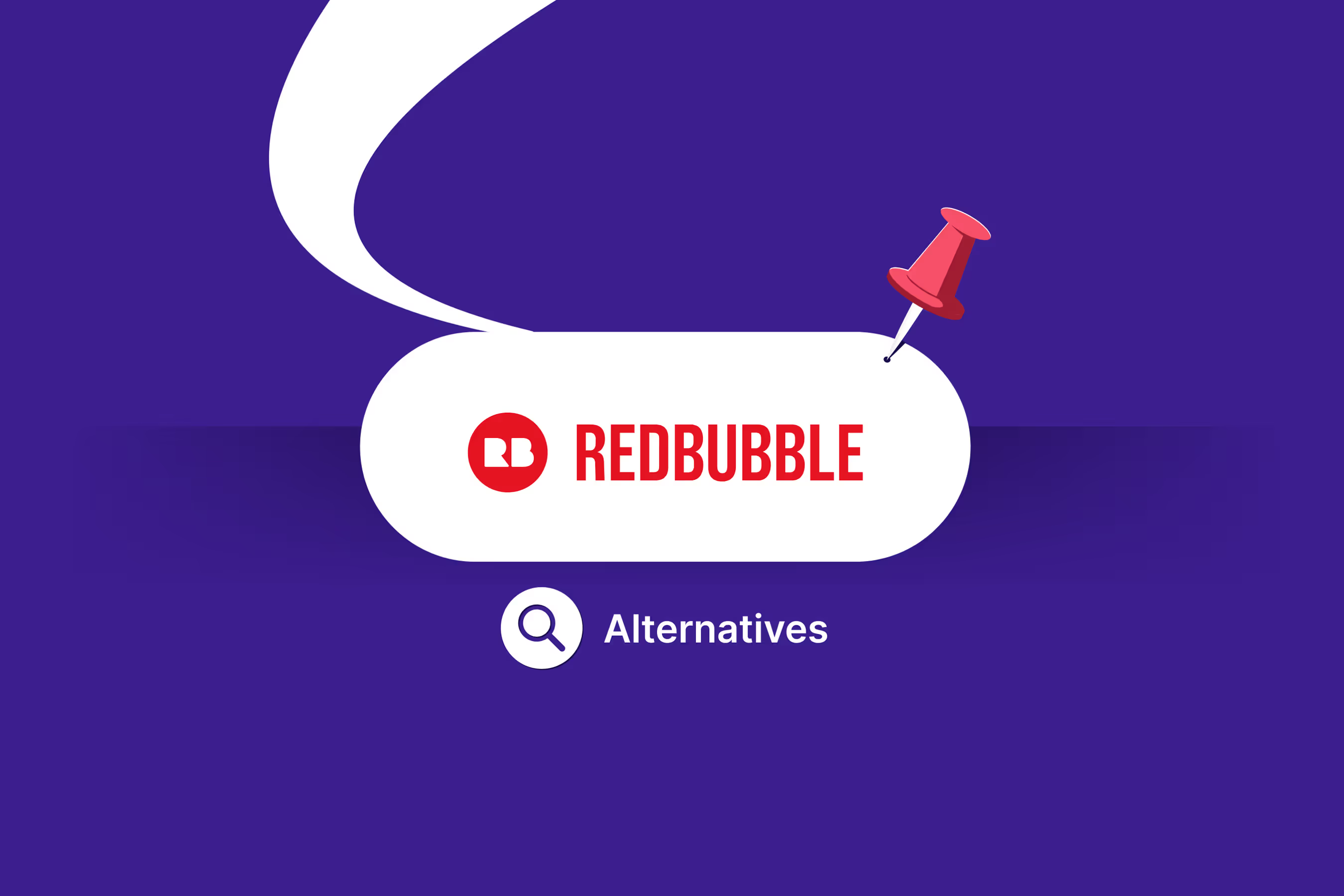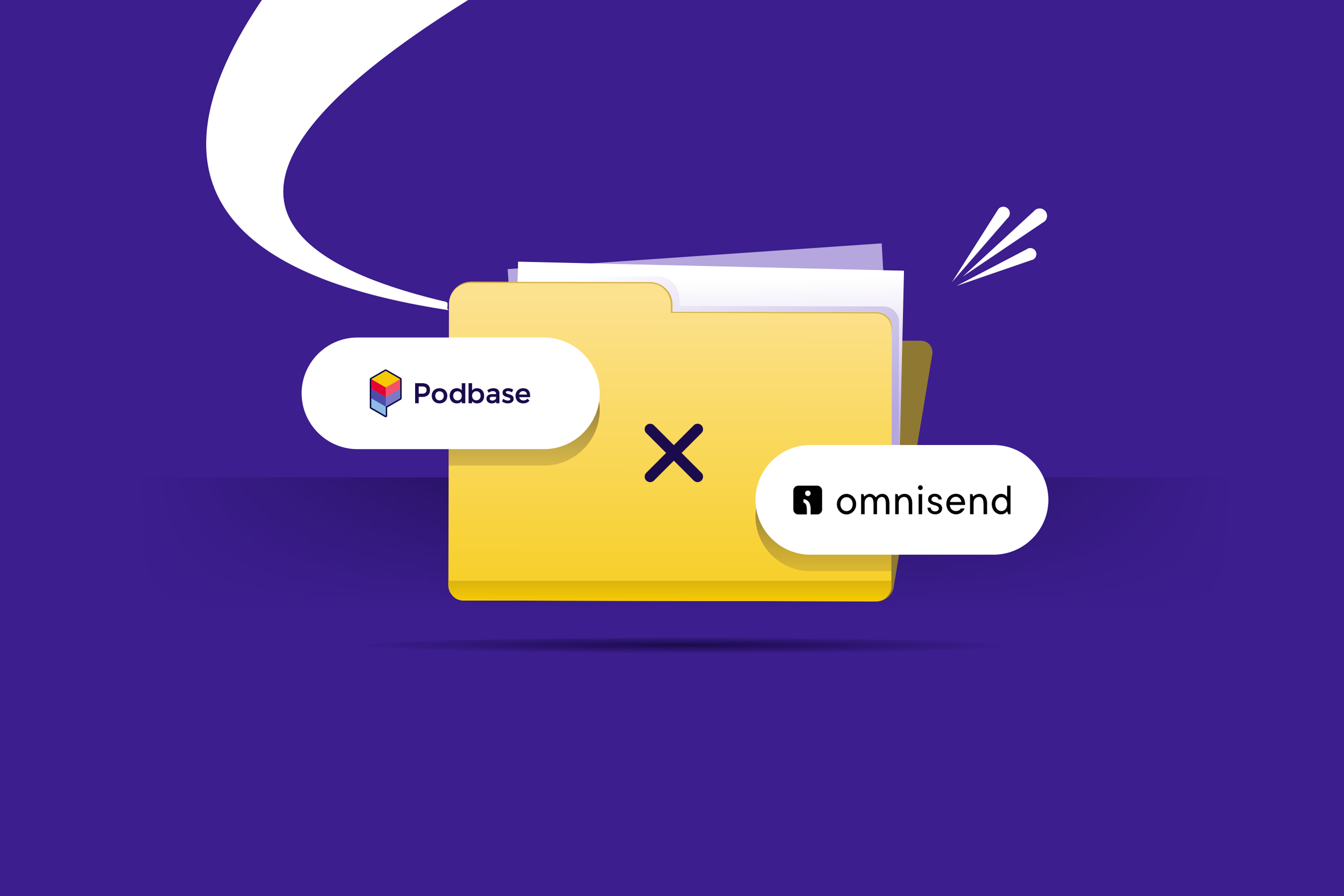Redbubble is a well-known site for selling print-on-demand products. But lately, many users feel frustrated. Lower profits and less control over designs are pushing them to explore other options.
If you want to make more money and grow your business faster, you need better tools. You need platforms that support branding, automation, and long-term growth.
In this post, we’ll share the top Redbubble alternatives to try in 2026. These picks come from real experience using these platforms for sales, automation, and scaling.
Ready to find the right fit for your business? Let’s dive in.
Why Creators Are Looking for Redbubble Alternatives
Redbubble helped many creators start with print-on-demand, but it has some downsides.
It has upload limits, low royalties, and limited customization. This makes it hard to grow your brand. For creators who want to build their print-on-demand businesses long-term, Redbubble may not be enough.
Here’s what most sellers are looking for now:
- Higher Pricing Control: Redbubble limits pricing and takes a big cut. Meanwhile, Redbubble alternatives let you set your profit margins.
- Better Product Range: Redbubble’s catalog is limited compared to other platforms. Many creators want access to tech accessories, home goods, and premium apparel.
- White-Label Options: Buyers often receive products with Redbubble branding. White-label platforms help you build a real brand. You can use custom packaging and skip third-party logos.
- Shopify and Etsy Integration: Redbubble works on its own and doesn’t connect to stores like Shopify or Etsy. Many sellers want tools that work with their websites and help them save time by managing orders and stock.
Podbase focuses on automation and real tools for POD growth. The platform combines:
- Branding freedom
- Mockup automation
- Multi-platform integration
These are not add-ons; they’re all essential tools in one place for scaling a POD business in 2026.
If you’re still relying solely on Redbubble, you’re leaving control and profits on the table.
Best Redbubble Alternatives for 2026 (With Pros and Cons)
There are dozens of Redbubble alternatives on the market. But not all of them support real business growth.
Below are the top Redbubble alternatives that offer more control, automation, and scalability.
Let’s break them down:
1. Podbase (Best for White-Label Branding & Automation)
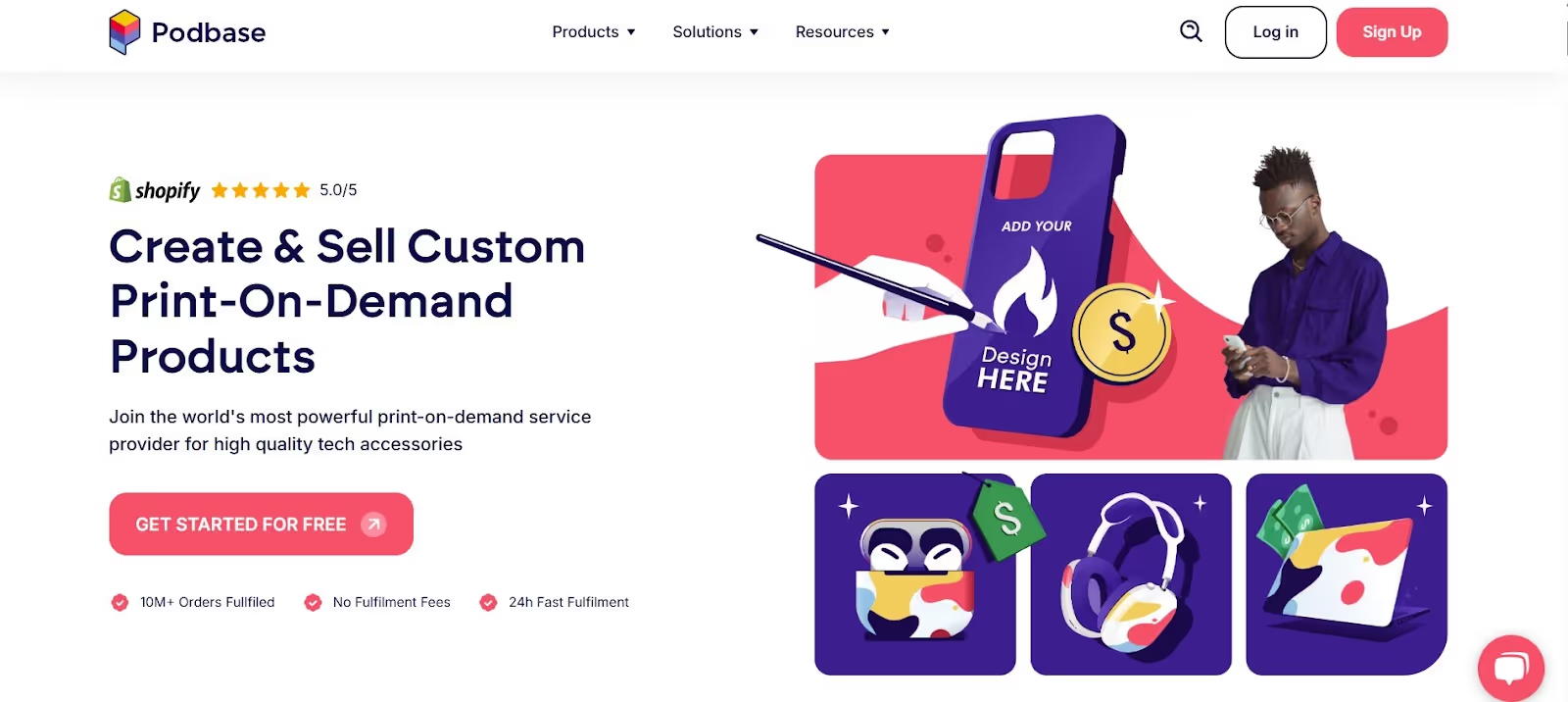
Podbase is a great choice for creators who want full control over their brand and how their store runs. It’s one of the best Redbubble alternatives, especially if you want to build a white-label business.
That means your products won’t have any third-party logos or tags. You get to choose the packaging, prices, and how your products look.
Podbase’s smart tools also help you save time. It automatically creates mockups for your products. You can easily connect your store to Shopify and Etsy. WooCommerce will be added soon, making it even more flexible.
Why It's Better:
- Fully white-labeled brand creation
- Auto-generated mockups across platforms
- Connects easily with Shopify and Etsy
- Transparent global shipping options
You can start without an inventory, and you stay in full control of your brand.
Also Read:
- How to Start an Online Store Without Inventory
- New & Classic Part-Time Business Ideas (That Actually Work)
- Podbase vs Redbubble: Best POD Platform | Podbase
2. Printful
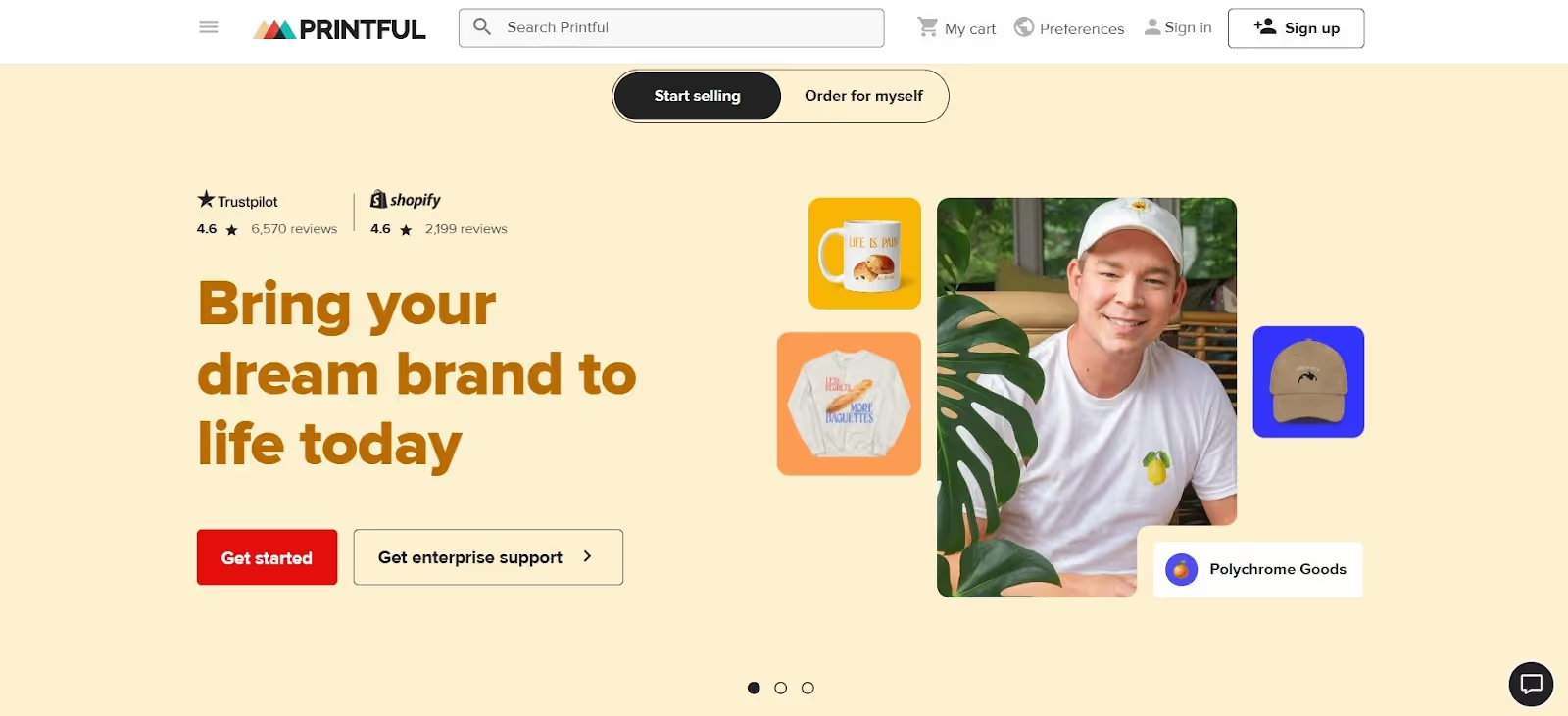
Printful is one of the well-known Redbubble alternatives for established brands looking for a print-on-demand company. It offers many products and high-quality prints. It’s great if you want a clean, professional look.
The platform integrates smoothly with Shopify, Etsy, and WooCommerce. You can add custom labels, packaging, and design. This helps you build your branding.
However, high base prices may cut into margins, especially for new sellers. It allows some branding but lacks the mockup automation and efficiency offered by Podbase.
The difference between Printful and Redbubble comes down to control versus convenience.
Printful gives full creative control, but it costs more. Podbase is one such print-on-demand company that offers the best of both worlds.
Pros:
- Great print quality
- Works well with Shopify, Etsy, and more
- Offers branding tools like custom labels
Cons:
- Base cost is more
- Orders can take longer to ship
- Few automation features for mockups or workflows
3. Printify
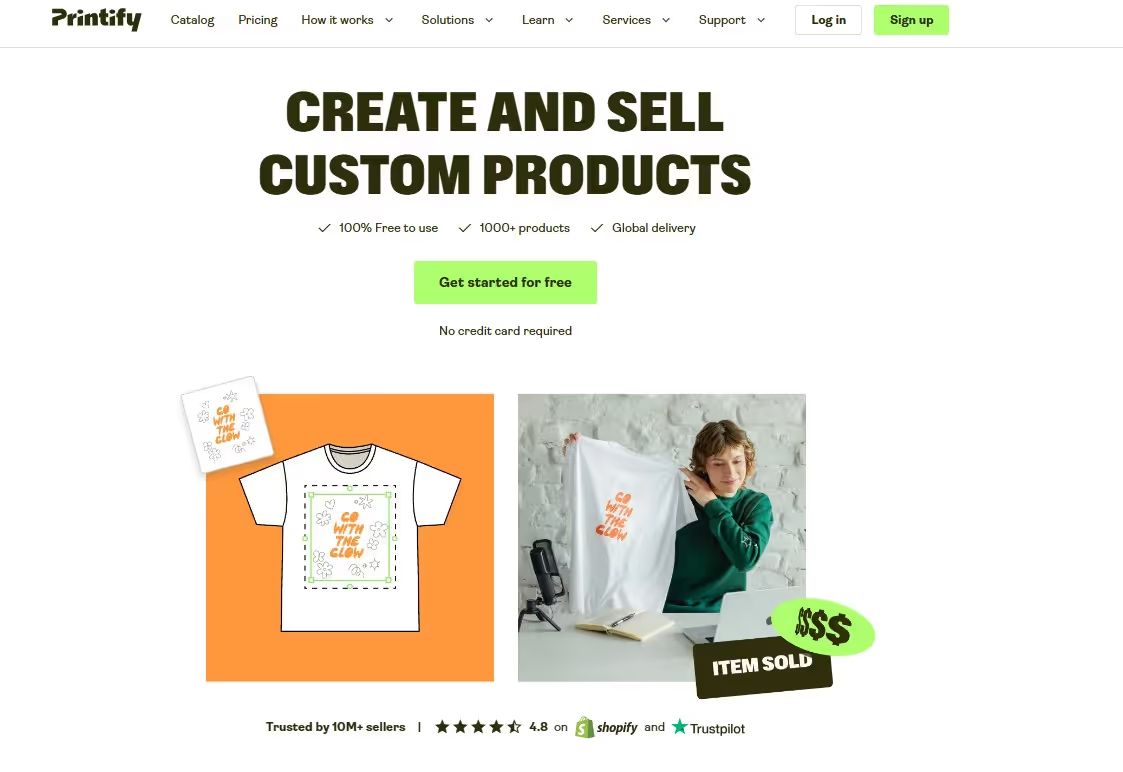
Printify is among the budget-friendly Redbubble alternatives with low base prices and flexible integrations. It connects to Shopify, Etsy, and Wix. You can start your store quickly and easily.
Unlike Redbubble print-on-demand, Printify offers more pricing control. This could mean higher potential profits if you price your products right.
But here’s the catch: the print quality depends on the provider you choose.
If quality varies too much, your brand may suffer. That’s a dealbreaker for some creators. It also doesn’t offer white-labeling or branded packaging, which limits your brand-building potential compared to Podbase.
Pros:
- Products are cheap to make
- Works with many online stores
- Simple to use
Cons:
- Print quality depends on the seller you pick
- Few branding options
- No automatic mockup tools
Test Print on dniche ideas with Printify. Then, switch to Podbase to scale with stronger branding control.
Also Read:
- What Is Print-On-Demand: Everything You Need To Know About It
- Print-on-Demand vs Dropshipping: The Essentials Explained
- How to Make Money Without a Job - 18 Real Ideas
4. Fourthwall
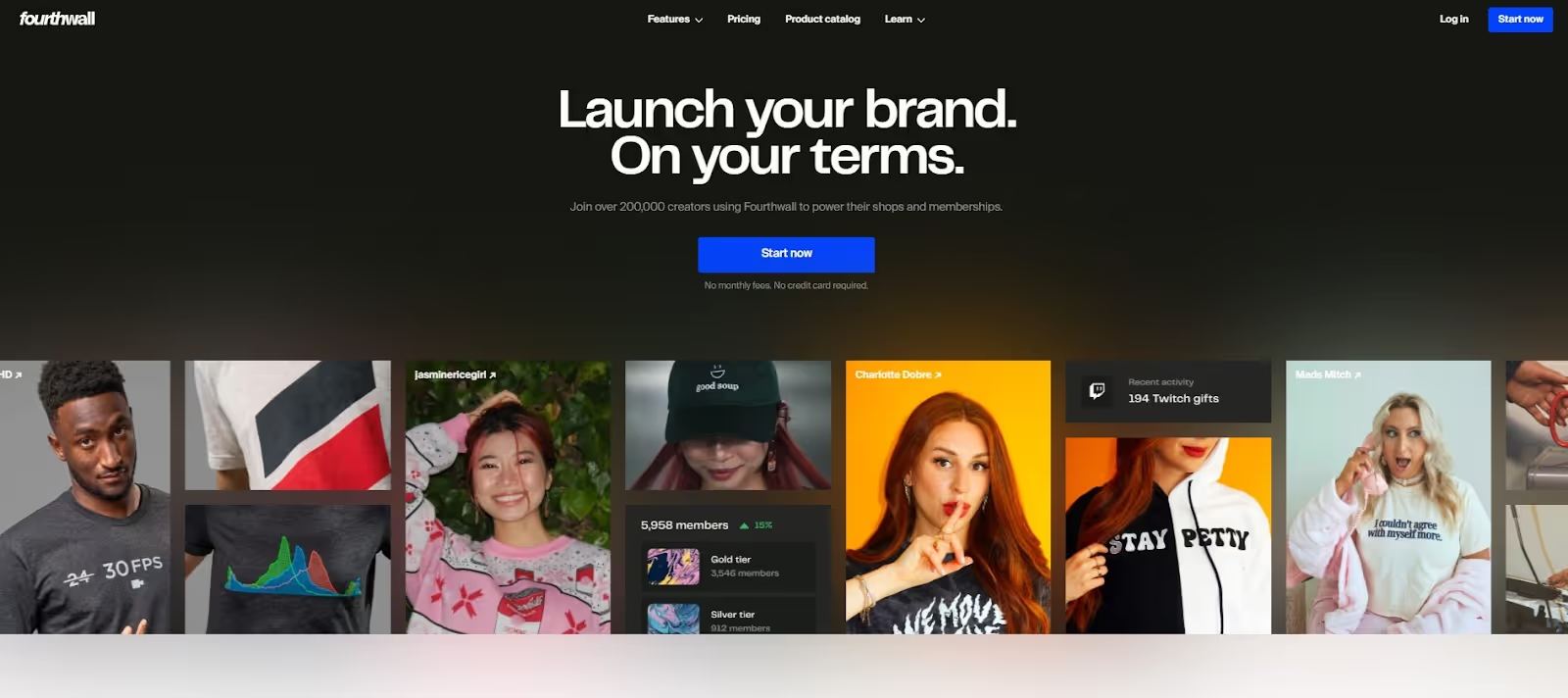
Fourthwall stands out among Redbubble alternatives because of its online store builder. It’s great for creators who want everything in one place.
You can sell print-on-demand products, digital files, and memberships on one site. You don’t need to install extra tools. Everything you need is already built in.
The website is easy to use and made for creators, not just online selling experts.
When comparing print-on-demand vs dropshipping, Fourthwall is more on the POD side. With traditional dropshipping, products are sourced from third parties. Fourthwall simplifies this by handling printing and fulfillment on one platform.
However, there’s a downside. Fourthwall is still growing worldwide. It has fewer shipping and support options outside North America. So, it works best for US customers. Creators from other countries might notice slower delivery times.
Also, you can use custom website addresses and some branding. However, it’s not fully white-label like Podbase. So, if you want complete control over your brand, keep this in mind.
Pros:
- Easy-to-use store builder
- Sell both physical and digital items
- Accept tips and subscriptions
Cons:
- Shipping outside the US can be slow
- Limited options to remove branding
- Fewer products to choose from
5. Sellfy
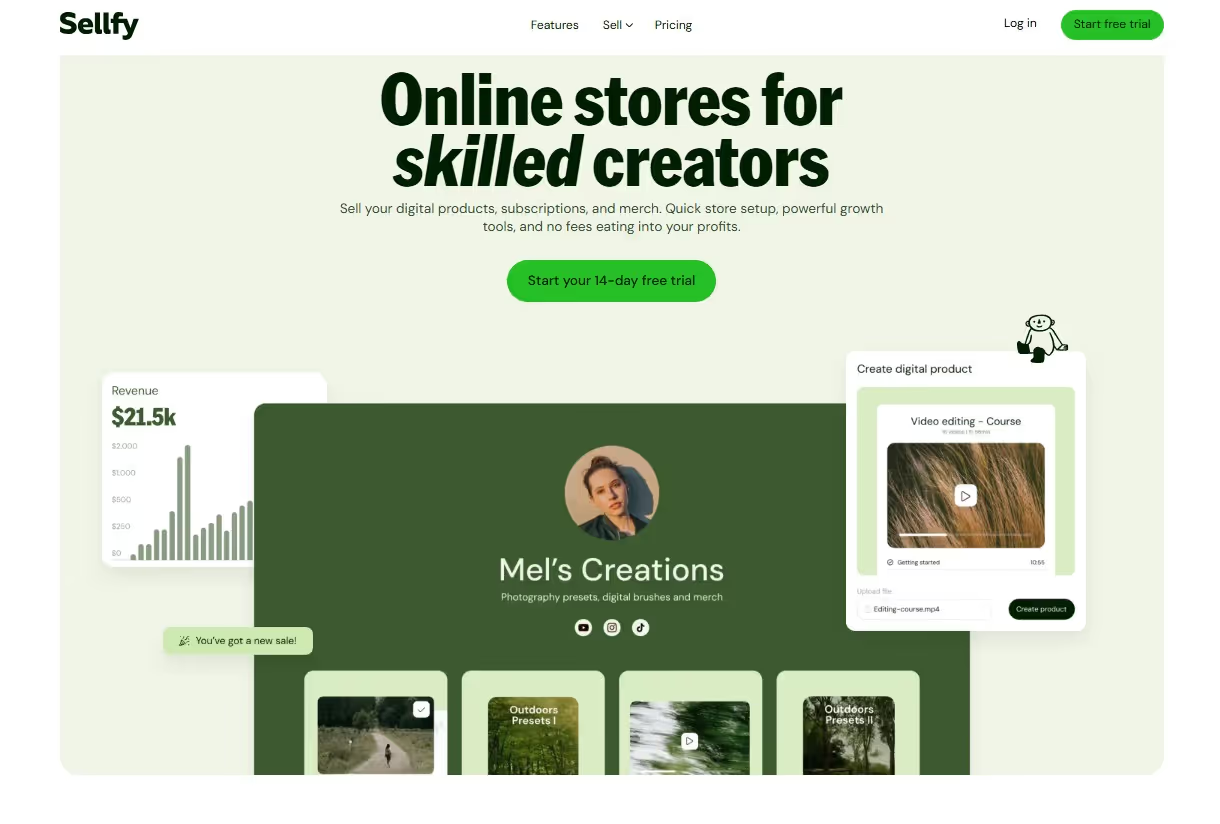
Sellfy is among the most popular Redbubble alternatives for starting a POD business. It works well for creators who want to sell both digital and physical products without using many platforms.
Sellfy lets you set up a simple and clean online store. You can sell ebooks, music, subscriptions, and more. If you’re exploring part-time business ideas, Sellfy can help you focus on making content and growing your audience.
Sellfy isn’t free and charges a monthly fee, which might feel like a big step for new sellers. It also offers fewer integrations compared to Printful or Podbase.
Sellfy offers a good middle ground among Redbubble alternatives. You get control over your brand without a full ecommerce site. The interface is easy to use, payouts go straight to you, and you can customize your store well without extra clutter.
Pros:
- Works well for selling both digital and physical products
- Easy to set up, no coding needed
- Clean design with good branding tools
Cons:
- Needs a paid monthly plan
- Fewer advanced ecommerce features
- Not the best choice for large product catalogs
Also Read:
- Best Dropshipping Products to Sell for Big Profits
- Best Print-On-Demand Niches: How to Discover Profitable Ideas For Your Business
- Best Zazzle Alternatives for Custom Printing
Other Notables
Here are more noteworthy Redbubble alternatives:
- Zazzle: Huge product range but limited branding control
- Society6: Great for artists, but you can’t change prices much
- TeePublic: Easy to join with a ready audience, but royalties are low
- Spring (Teespring): Good for beginners, but higher base prices reduce profits
- Displate: Focuses on metal wall art with better profits, but it’s a niche market
- Fine Art America: Best for selling photography and fine art prints on a large scale
- Design By Humans: Focused on apparel, with a strong art community
- Gelato: Fast shipping worldwide, but limited product customization
- CafePress: An old platform with many products
- Merch by Amazon: Huge audience through Amazon, but it’s hard to get accepted
How to Choose the Best Redbubble Alternatives for Your Business
Not every Redbubble alternative will work for every creator. The right one depends on what matters most, whether it’s control, ease of use, bigger profits, or built-in traffic.
Here’s how to find the best fit:
1. Decide Your Business Model
Think about how involved you want to be in your business.
- Want full control? Try white-label platforms like Podbase or Printful. Manage your pricing, branding, and store setup.
- Want built-in traffic? Choose marketplaces like Society6 or Zazzle. These platforms handle discovery and order delivery.
2. Focus on Platform Features
Don’t just look at the products. Choose Redbubble alternatives that save you time and help you grow.
Look for platforms with:
- Easy integration with Shopify or Etsy
- Automated mockups and branding tools
- Global printing for faster local shipping
Still exploring? Scroll down for more Redbubble alternatives that fit different styles and goals.
Redbubble vs Podbase: What You’re Really Missing Out On
Redbubble is easy to use, but it can hold back your brand. Podbase gives creators more control, more options, and better tools to grow over time.
Podbase empowers thousands of print-on-demand entrepreneurs worldwide to build their white label brand.
Here’s how they compare:
Also Read:


